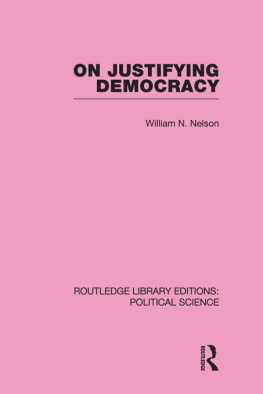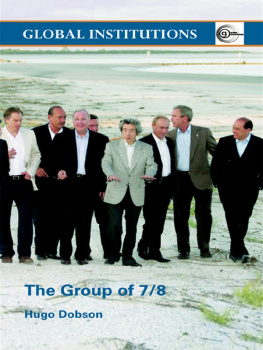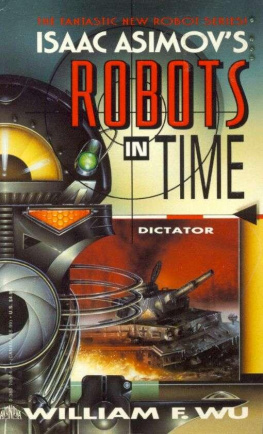William J. Dobson - The Dictator’s Learning Curve: Inside the Global Battle for Democracy
Here you can read online William J. Dobson - The Dictator’s Learning Curve: Inside the Global Battle for Democracy full text of the book (entire story) in english for free. Download pdf and epub, get meaning, cover and reviews about this ebook. year: 0, genre: Politics. Description of the work, (preface) as well as reviews are available. Best literature library LitArk.com created for fans of good reading and offers a wide selection of genres:
Romance novel
Science fiction
Adventure
Detective
Science
History
Home and family
Prose
Art
Politics
Computer
Non-fiction
Religion
Business
Children
Humor
Choose a favorite category and find really read worthwhile books. Enjoy immersion in the world of imagination, feel the emotions of the characters or learn something new for yourself, make an fascinating discovery.

- Book:The Dictator’s Learning Curve: Inside the Global Battle for Democracy
- Author:
- Genre:
- Year:0
- Rating:4 / 5
- Favourites:Add to favourites
- Your mark:
- 80
- 1
- 2
- 3
- 4
- 5
The Dictator’s Learning Curve: Inside the Global Battle for Democracy: summary, description and annotation
We offer to read an annotation, description, summary or preface (depends on what the author of the book "The Dictator’s Learning Curve: Inside the Global Battle for Democracy" wrote himself). If you haven't found the necessary information about the book — write in the comments, we will try to find it.
The Dictator’s Learning Curve: Inside the Global Battle for Democracy — read online for free the complete book (whole text) full work
Below is the text of the book, divided by pages. System saving the place of the last page read, allows you to conveniently read the book "The Dictator’s Learning Curve: Inside the Global Battle for Democracy" online for free, without having to search again every time where you left off. Put a bookmark, and you can go to the page where you finished reading at any time.
Font size:
Interval:
Bookmark:
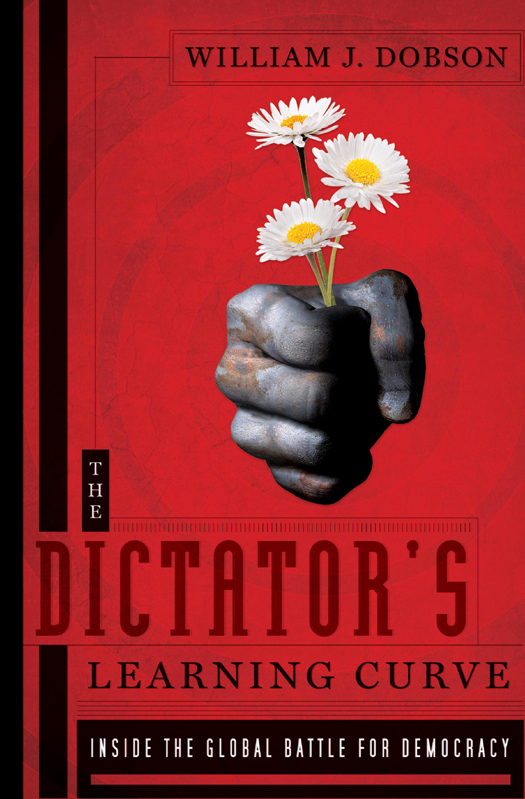
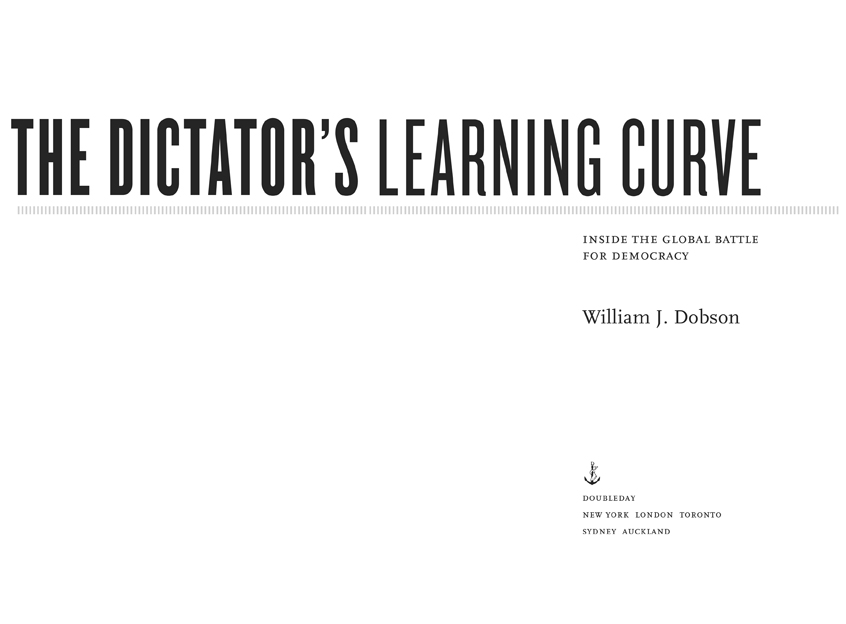
Copyright 2012 by William J. Dobson
All rights reserved. Published in the United States by Doubleday, a division of Random House, Inc., New York and in Canada by Random House of Canada Limited, Toronto.
www.doubleday.com
DOUBLEDAY and the portrayal of an anchor with a dolphin are registered trademarks of Random House, Inc.
Jacket design by Michael J. Windsor
LIBRARY OF CONGRESS CATALOGING-IN-PUBLICATION DATA
Dobson, William J.
The dictators learning curve : inside the global battle for democracy / by William J. Dobson.1st ed.
p. cm.
1. Democratization. 2. Dictatorship. I. Title.
JC423.D666 2012
321.8dc23 2011050286
eISBN: 978-0-385-53336-2
v3.1_r1
For Kelly, Kate, and Liam
Democracy, freedom, human rights have come to have a definite meaning to the people of the world which we must not allow any nation to so change that they are made synonymous with suppression and dictatorship.
ELEANOR ROOSEVELT SPEAKING AT THE SORBONNE, SEPTEMBER 28, 1948


P eter Ackerman sits in his spacious corner office at the end of Pennsylvania Avenue. From his perch, he literally looks down on the World Bank. The sixty-four-year-old Ackerman is the managing director of Rockport Capital Incorporated, a discreet boutique investment house, and on a crystal clear August afternoon he is walking me through a PowerPoint presentation, talking to me about risk returns. The slides, however, have nothing to do with investments, dividends, or finance; rather, the topic is the best way to overthrow a dictator.
Twenty-five years ago, Ackerman would have seemed an unlikely person to be giving advice on how to confront the worlds worst regimes. He was too busy making a killing on Wall Street, the right-hand man to the junk bond king Michael Milken. In 1988, Ackerman earned $165 million for organizing the $25 billion leveraged buyout of RJR Nabisco. When an insider-trading scandal broke, sending Milken to jail, Ackerman paid $80 million to the U.S. government and walked away with roughly $500 million.
A considerable part of that fortune is now being channeled into helping topple tyranny around the globe. In 2002, Ackerman founded the International Center on Nonviolent Conflict, which runs seminars, workshops, and training sessions on successful nonviolent strategies and tactics for overthrowing repressive regimes. Activists from Egypt, Iran, Russia, Venezuela, Zimbabwe, and dozens of other countries know Ackerman well. Some have visited these top-floor offices in Foggy Bottom. Some have attended his workshops in half a dozen different foreign capitals. Others have watched his filmsmost commonly, Bringing Down a Dictator, which tells the story of how young Serbs deposed Slobodan Miloevic in October 2000. The film won a Peabody Award and has been translated into Arabic, Farsi, Mandarin, Vietnamese, and at least seven other languages. Georgians widely credited the film for helping to inspire their 2003 Rose Revolution, a peaceful democratic rebellion that removed the former Communist boss Eduard Shevardnadze. In 2006, Ackerman also got into the video game business, paying for the development of A Force More Powerful, a game that lets activists practice their strategies for ousting tyrants in a virtual world. Thousands of copies have found their way into some of the worlds most repressive countries. In 2010, he released a new game called People Power. (The game is the most subversive thing I have ever done, he says. I have spent millions improving it.) When I ask him why he is making the task of defeating tyrants his lifes work, he looks at me and says, Im just in the distribution business. Im just responding to demand, thats all. And, he could have added, business is good.
It is not easy being a dictator today. Not long ago, an autocrat, whether a nationalist strongman, revolutionary hero, or Communist apparatchik, could use blunt weapons to keep his people under his thumb. Joseph Stalin sent millions of his countrymen to the gulag. Mao Zedong launched mass revolutionary campaigns targeting intellectuals, capitalists, and any group in China he believed to be insufficiently red. His Great Leap Forward cost more than 35 million lives in a handful of years. The regime of the Ugandan dictator Idi Amin murdered as many as 500,000 people. In three years, nearly 2 million Cambodians died in Pol Pots killing fields. In February 1982, Hafez Assad crushed an uprising in the Syrian city of Hama. After besieging the city with attack helicopters and heavy artillery, his troops went house to house. More than 25,000 Syrians were slaughtered before the month was over.
Dictators are still capable of great crimes. But today the worlds despots have more forces arrayed against them than ever before. With the end of the Cold War, many lost their chief sponsor and economic lifeline in the Soviet Union. The democracy promotion business became a cottage industry, almost overnight: an army of Western experts, activists, and election monitors now stands at the ready to shine a spotlight on human rights abuses, gross corruption, and election rigging. Twenty years ago, Beijings leaders only needed to worry about the glare of television cameras when the tanks rolled into Tiananmen Square. As soon as the Chinese Communist Party declared martial law, it literally pulled the plug on CNNs broadcast. No longer. In 2006, an expedition of European mountain climbers filmed Chinese soldiers shooting Tibetan monks, women, and children on a nineteen-thousand-foot mountain pass high in the Himalayas. The slaughter was quickly broadcast on YouTube and led to denunciations of Chinas violence toward refugees by international human rights groups. In 2011, Syria banned all foreign journalists from reporting on the countrys uprising against Bashar Assads regime. No matter; each day Syrian activists posted shocking footage of the governments brutal repression, as peaceful protesters and funeral processions became targets for the regimes snipers. Today, the worlds dictators can surrender any hope of keeping their worst deeds secret: if you order a violent crackdowneven on a Himalayan mountain passyou now know it will likely be captured on an iPhone and broadcast around the world. The costs of tyranny have never been this high.
The tide began to turn against dictators long before the Internet or Twitter, and even well before the collapse of the Soviet Union. Their troubles really began in Portugal in 1974. To be precise, they began at 12:25 the morning of April 25, when a Lisbon radio station played the song Grndola, Vila Morena, a signal to units in the Portuguese military to commence a coup. By the next day, Portugals dictator, Marcello Caetano, had been driven into exile. According to the scholar Samuel Huntington, the political forces released on that day marked the beginning of a global democratic wave that would lead to authoritarian regimes giving way to democracy for decades to come.
After Portugal, a string of right-wing dictatorships collapsed across southern Europe. The military juntas in Latin America and authoritarians in East Asia followed. All were shocks, but the 1989 collapse of Communist governments across Eastern Europe was a seismic shift. In 1974, there had been only forty-one democracies throughout the globe. By 1991, when the Soviet Union also fell, the number of democratic governments had jumped to seventy-six.
Font size:
Interval:
Bookmark:
Similar books «The Dictator’s Learning Curve: Inside the Global Battle for Democracy»
Look at similar books to The Dictator’s Learning Curve: Inside the Global Battle for Democracy. We have selected literature similar in name and meaning in the hope of providing readers with more options to find new, interesting, not yet read works.
Discussion, reviews of the book The Dictator’s Learning Curve: Inside the Global Battle for Democracy and just readers' own opinions. Leave your comments, write what you think about the work, its meaning or the main characters. Specify what exactly you liked and what you didn't like, and why you think so.




